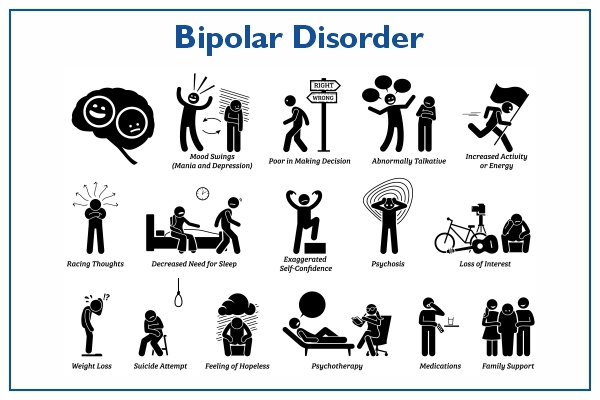How To Support Someone With Bipolar Disorder
Supporting someone with bipolar disorder can be challenging yet profoundly rewarding. Bipolar disorder, characterized by extreme mood swings ranging from manic highs to depressive lows, can significantly impact a person’s life and relationships. Here are ways to provide meaningful support, ensuring the well-being of both the individual and yourself.
https://www.youtube.com/@akhildhanda8867
Understanding Bipolar Disorder
Before offering support, it’s crucial to understand what bipolar disorder entails. Bipolar disorder is a mental health condition marked by significant mood changes, including manic episodes (elevated mood, high energy, and sometimes risky behavior) and depressive episodes (low mood, fatigue, and loss of interest in activities). These mood swings can vary in intensity and duration, affecting daily functioning and relationships.
Educate Yourself
Knowledge is empowering. Learn about the different types of bipolar disorder, symptoms, treatment options, and how the disorder affects daily life. Understanding the condition helps in empathizing with the person and recognizing that their behavior is a result of the disorder and not a personal choice.
Open Lines of Communication
Encourage open, non-judgmental communication. Let the person know you are there to listen and support them without offering unsolicited advice or criticism. Sometimes, just having someone to talk to can be immensely comforting.
Be Patient and Compassionate
Supporting someone with bipolar disorder requires patience. Mood swings can be unpredictable and challenging to handle. Showing compassion and patience helps the person feel understood and supported, reducing feelings of isolation.
Encourage Professional Help
Professional help is crucial in managing bipolar disorder. Encourage the person to seek help from mental health professionals such as psychiatrists, psychologists, or counselors. Support them in attending therapy sessions and adhering to prescribed treatment plans, including medication.
Create a Supportive Environment
A stable and supportive environment can significantly aid in managing bipolar disorder. Ensure the person has a safe, non-judgmental space where they can express their feelings. Reduce stressors in the environment, as stress can trigger mood swings.
Recognize and Respond to Symptoms
Being aware of the symptoms of manic and depressive episodes allows you to respond appropriately. During a manic episode, the person may exhibit high energy, reduced need for sleep, and impulsive behavior. During depressive episodes, they may experience low energy, sadness, and withdrawal. Offer support tailored to the specific symptoms they are experiencing.
Encourage Healthy Lifestyle Choices
A healthy lifestyle can help manage bipolar disorder. Promote a healthy diet, regular exercise, and enough sleep. These practices can stabilize mood and improve overall well-being. Avoid substances like alcohol and drugs, as they can exacerbate symptoms.
Respect Their Treatment Plan
Respect and support the person’s treatment plan, which may include medication and therapy. Encourage adherence to the treatment plan and attend appointments if they wish. Refrain from suggesting changes without consulting their healthcare provider.
Be Aware of Triggers
Identify and help avoid potential triggers that can lead to mood swings. Common triggers include stress, lack of sleep, and major life changes. Encourage stress-reduction techniques such as mindfulness, meditation, or hobbies they enjoy.
Offer Practical Support
Practical support can be incredibly helpful. Assist with daily tasks, especially during depressive episodes when the person may struggle with routine activities. Help them manage responsibilities and reduce overwhelming tasks.
Set Boundaries
While it’s important to offer support, it’s equally vital to set boundaries to protect your own well-being. Supporting someone with bipolar disorder can be demanding, and maintaining your mental health is crucial. Establish clear boundaries and communicate them respectfully.
Stay Connected
Maintaining social connections is essential for both you and the person you are supporting. Encourage social interactions and stay connected with friends and family. Social support networks can provide additional help and reduce feelings of isolation.
Educate Others
If the person with bipolar disorder is comfortable, educate others about the condition. Awareness reduces stigma and promotes understanding, creating a more supportive environment. Advocate for mental health awareness in your community.
Plan for Emergencies
Bipolar illness can cause suicidal thoughts or actions in extreme circumstances. Have a plan in place for emergencies. Know the contact information for mental health crisis hotlines and local emergency services. Ensure that the person knows they can reach out to you in times of crisis.
Practice Self-Care
Supporting someone with bipolar disorder can be emotionally taxing. Prioritize your own self-care to maintain your well-being. Engage in activities you enjoy, seek support from friends or support groups, and consider professional counseling if needed.
Recognize Your Limits
Understand that you cannot “fix” the person or their condition. Bipolar disorder is a complex mental health condition that requires professional treatment. Recognize your role as a supporter and not a mental health professional.
Celebrate Small Victories
Acknowledge and celebrate small victories in the person’s journey with bipolar disorder. Positive reinforcement can boost their morale and encourage them to continue with their treatment and self-care routines.
Stay Hopeful
Bipolar disorder can be managed effectively with the right treatment and support. Stay hopeful and encourage the person to stay positive about their treatment journey. Remind them that recovery is possible, and setbacks are a part of the process.
Conclusion
Supporting someone with bipolar disorder requires understanding, compassion, and patience. By educating yourself, maintaining open communication, encouraging professional help, and creating a supportive environment, you can make a significant positive impact on their life. Remember to take care of your own well-being and seek support when needed. With the right approach, you can help your loved one manage bipolar disorder and lead a fulfilling life.
For any further queries, Plz visit psychiatristdrakhildhanda.com or you can check our social media accounts, Facebook, Instagram







